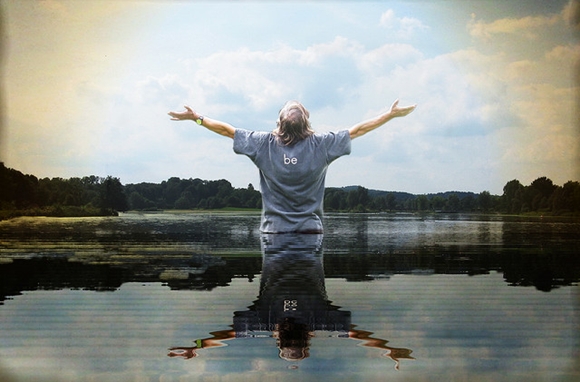In a previous post, I alluded to the idea that what we experience is a kind of echo of our inner world. In this post, I would like to explore this idea a little further.
Those who act on the world never, I notice, succeed. The world is a strange instrument, not meant to be handled.
This stanza from the Tao Te Ching suggests that to attempt to change the world is never a wise thing to do. Of course, people try to control the world all the time – we try to control our kids, our parents, our spouses, our careers, our health … this list goes on.
But all these things are largely beyond our control. We are like the Viking Cnut, commanding that the tide not come in, only to see the waves lapping around our feet.
Everything contains within itself a natural structure – a kind of ‘grain’ – and to meddle with this structure and try to redirect things according to our will is as futile as commanding the tides; at its worst, it can be damaging and destructive. Just as cutting wood against the grain is difficult and does not yield a good product, to try to change the world through effort is a pointless and self-defeating enterprise.
But what about trying to change ourselves? Is this within our power? Can we mould ourselves according to our will? In a sense, the answer is most definitely ‘no’ – we are part of the world, and we cannot force ourselves to be what, by nature, we are not. To do so would be acting ‘against the grain.’ But, in another sense, we are free to change ourselves, and the remarkable thing is that, when we do so, the whole world seems to change around us.
We are not separate from the world around us. We are part of the world – we came from the elements that make up the rest of the universe, and we will return to them. Any sense of separation we have is pure illusion – and so the same rules apply. There is a wrong way to try to bring about change, whether it be in ourselves or in the outside world – and this is force.
But there is a key to effecting successful change: it is the practice of awareness. It starts within us and it ripples out to the rest of the world. Let me try to explain by way of an example from my own recent experience.
I had a problem with noisy neighbors. They live in the apartment above me; they bang about, drag furniture and sing loudly. I don’t understand why they behave this way: I have explained to them several times that I am disturbed by their behavior, and yet, a year after they moved in, there was no change. I don’t see why they can’t try to be a bit quieter but, despite my best efforts, the situation did not improve.
The only thing I have any power to change is my own approach. So I decided to try to become more accepting and to simply observe the situation without comment, as far as possible.
They are still noisy. But since observing the situation, I actually notice the noise less. This seems odd, but I think it is because I am noticing several features of the noise that were not apparent when I was focused on being bothered by it. First, it is clear that the noise is located within a surround of silence, as if the noises are islands in a sea of silence. Secondly, the noise ebbs and flows – it goes on for a while, but then it fades away. Like everything, it changes – its intensity, its quality, its volume – they all change continually.
Through a simple process of awareness, I have changed the way I am seeing the situation. It has taken on a different quality since I stopped labeling the noise as ‘bad’ and started to focus simply on observing it. And so, in a sense, the situation has itself changed. My outer reality has come to reflect my inner perspective.
I am reminded of the famous optical illusion where one sees either an old hag or a beautiful young woman – exactly the same image can appear to be utterly different, depending on our point of view.
When we submit to the natural flow of things, observing and allowing life to carry us, rather than trying to use force to change things around us, the world seems to become a more peaceful and supportive place. Indeed, submission is the only sensible option. Of course, we tend to think of submission as a weakness -‘giving up’ is synonymous with failure. But, when we ‘give up’ our tendency to label, to explain, to control, things start to work.
When we stop trying to force change, we become free. I can give no better advice than Anthony de Mello, author of the wonderful book, Awareness:
Don’t change: Desire to change is the enemy of love.
Don’t change yourselves: Love yourselves as you are.
Don’t change others: Love all others as they are.
Don’t change the world: It is in God’s hands and he knows.
And if you do that change will occur
Marvelously in its own way and in its own time
Yield to the current of life unencumbered by baggage.
Photo by h.koppdelaney






A super philosophical post for this blog. Enjoyed it thoroughly. I wonder this is true! The best way to change the world is be the part of change rather than be a leader. That’s how change happens. If everyone is racing to become a leader, everyone is missing the point.
Many people still hold the belief that we are separate from one another. I like Wayne Dyer’s explanation of this, he says that we are no different then tiny individual droplets of water that make up an entire ocean.
I lived in a townhouse before and had a noisy neighbor same as you. I tolerated it for a while but I decided to sell my townhouse and buy a farmhouse with over an acre of land. Noisy neighbor problem solved.
Thanks @Justin – since I live in Hong Kong, it’s pretty hard to find a secluded spot like that!
Dang, I would go mental then. Need my peace and quiet.